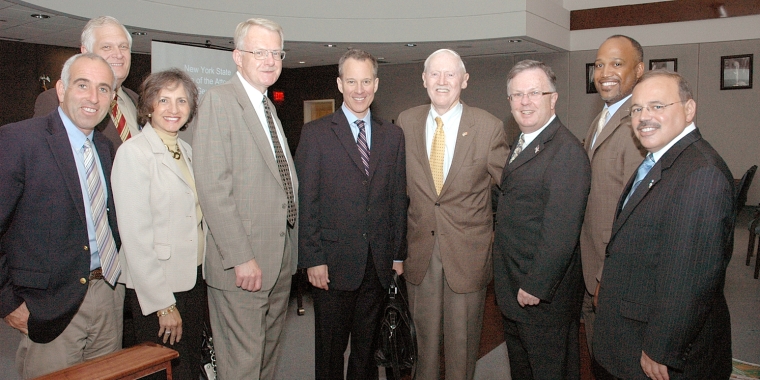
Mta Bailout Bill Includes Job Killing Taxes, Massive New Local Mandates, Property Tax Hikes and No Reform
Owen H. Johnson
May 13, 2009
State Senator Owen H. Johnson (4th Senate District) voted against Governor Paterson’s $2.2 billion MTA tax bailout plan approved by the Legislature which imposes a payroll tax on every Long Island business, non-profit, library, hospital, nursing home, local government and school, and increases vehicle registration and driver’s license fees for the second time this year. Senator Johnson called the secretly-negotiated MTA bailout deal a massive new mandate that will drive up local property taxes, increase taxes on jobs and does little to reform overspending by the MTA.
Senator Johnson said, “While it is crucial that we support our mass transit system, this MTA bailout plan fails everyone on Long Island. Ultimately, this tax will be passed onto Long Island’s families who are already overburdened with soaring school taxes and a bad economy. The fee and fare increases will be a costly blow to commuters and drivers alike.”
Even with the bailout plan, the MTA is also expected to hike Long Island Rail Road and subway fares 25 percent over the next four years. In addition, Nassau and Suffolk County taxpayers will have to pay an additional $9 million in combined property taxes to pay for the payroll tax imposed on all of Long Island’s county, town and village governments.
Among the harmful taxes and fees included in Governor Paterson’s MTA tax bailout plan are:
Payroll Tax Hike:
The $1.5 billion payroll tax, which is the centerpiece of this plan, will be devastating for businesses, not-for-profits, hospitals, local governments and school districts. The payroll tax is a tax on jobs that will hurt New York’s ability to recover from the national economic recession.
“This new jobs tax follows more than $8.5 billion in new taxes and fees that were included in the 2009-10 state budget, which, like this MTA bill, was negotiated completely behind closed doors,” Senator Johnson said. “The payroll tax will make New York less economically competitive, will hurt businesses and force more job losses. Between the budget and this bill, New Yorkers in the downstate region will be paying more than $10.5 billion in new taxes, fees and fare hikes.”
All told, the payroll tax will cost Suffolk County School Districts $14,709,880 each year and Nassau County School Districts an estimated $13,321,396 each year. The total impact of the tax on municipalities within Suffolk County will be $4,389.737 and Nassau County municipalities will have to pay a total of $4,911,370 more in taxes. It is also estimated that the payroll tax will cost the three Long Island BOCES approximately $1 million.
Senator Johnson said that Democrats contend the payroll tax is needed because revenue from the Real Estate Transfer tax, and other taxes used to fund the MTA, is declining. However, the bill does not include any provisions for the new tax on jobs to phase out when real estate and other revenues rebound. This tax is permanent.
The jobs tax will hit businesses hard, especially hospitals and nursing homes that were hit with hundreds of millions of dollars in new taxes in the state budget. Nonprofit organizations, already struggling to stay afloat, will also be punished by the jobs tax.
School Property Tax Hike:
Senator Johnson said that while the plan calls for public school districts to be reimbursed after they pay the payroll tax, the earliest they could be reimbursed would be April 1, 2010 - - virtually assuring they will have to raise school property taxes this year and next year.
“If Governor Paterson was serious about relieving school districts from the MTA job tax mandate, he would have simply exempted them,” Senator Johnson said. “Since the Governor and others before him have sought to cut state aid to suburban school districts, there is no guarantee that they will ever get the reimbursement money from the state and that means people paying some of the highest property taxes in the country will pay even more.”
Senator Johnson also said the estimated cost of the MTA payroll to school districts is closer to $100 million, far more than the $60 million Governor Paterson estimated for his school reimbursement promise. Private, parochial and charter schools would not be reimbursed for this new tax and may have to raise tuition to pay it.
25 Percent Hike for LIRR, Subway and Bus:
The Long Island Rail Road, New York City buses and subway fares are expected to increase 10 percent this year and increase again by 7.5 percent in both 2011 and 2013 to a total of 25 percent.
Taxi Cab Tax:
A 50-cent surcharge on taxi rides that originate in New York City beginning on November 1, 2009.
Vehicle Registration, Driver’s Licenses and Learner’s Permits to Cost More:
The bailout plan increases motor vehicle registration and re-registration fees by $25 annually. It also increases the cost of driver’s licenses and learner’s permits by $2 annually. These fee increases are in addition to those enacted in Governor Paterson’s 2009-2010 state budget. This means the average family in the MTA region will now pay hundreds more annually to license and register their cars.
Auto Rental Tax:
The bailout plan increases the sales tax on auto rentals within the 12-county MTA region by five percent. This tax increase is in addition to those enacted in Governor Paterson’s 2009-2010 state budget.
No Fix For Long Island Roads And Bridges:
For decades, the state approved five-year capital plans for the MTA and for road and bridge projects Upstate and on Long Island. For the first time in memory, that parity is ignored as the MTA bill funds a two-year capital plan for mass transit. However, there is no road and bridge capital plan, only vague promises by the Governor to do something in the future.
Massive Mandate on Local Government Taxpayers:
The MTA bill comes just days after Governor Paterson announced that he was committed to not placing new mandates on local governments. On Long Island alone, Nassau and Suffolk County taxpayers will have to pay an additional $9 million (combined) in county property taxes. Other cities, towns and villages will pay millions more.
“The Democrats are hailing this bill as a win, but it’s really a big loss for taxpayers, homeowners, local governments, businesses and even many commuters who are going to be paying more for many, many years because of this bill,” Senator Johnson said.
####
Share this Article or Press Release
Newsroom
Go to NewsroomNewsday: October 31st Deadline Approaching For Irene Aid
October 21, 2011

Richard W. Walser, Esq. Presented With NY Senate Citation
October 18, 2011

